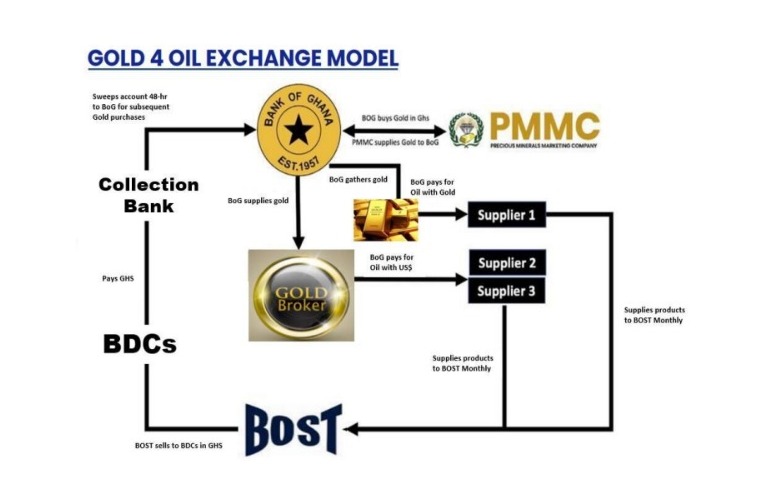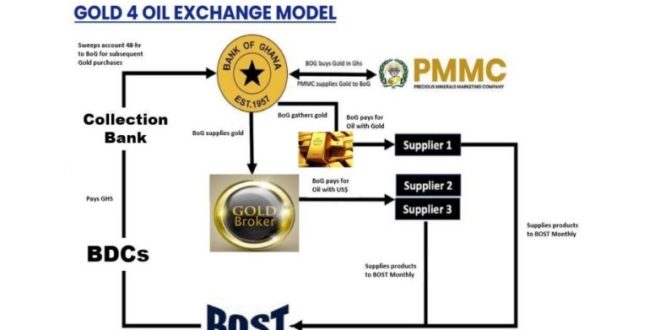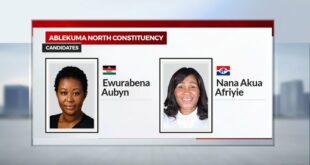Introduction:
1. The Gold for Oil (G4O) Programme is an initiative of the Government of Ghana to use the existing Bank of Ghana (BoG) Domestic Gold Purchase (DGP) Programme to support the import of petroleum products into Ghana.
2. The prime objective of the programme is to use additional foreign exchange resources from the BoG’s DGP programme to provide foreign currency for the importation of petroleum products for the country which currently stands at about USD350 million per month.
3. The government has begun the implementation of the G4O Programme where gold purchases under the BoG’s DGP Programme mainly through the Precious Minerals and Marketing Company (PMMC) and where required from aggregators and mining firms is used to purchase petroleum products.
4. This is intended to free up foreign exchange resources to meet petroleum imports of the country thereby reducing pressures on the Bank of Ghana’s foreign reserves and the banking sector emanating from the Bulk Import, Distribution and Export Companies (BIDECs) request for foreign exchange.
5. The programme also aims to procure petroleum products at very competitive prices through Government-to-Government (G2G) arrangements. The programme will ensure that the cost of importing the products from international oil traders will always be comparatively lower.
6. The consequent reduction in foreign exchange pressures, the reduction in premiums charged by international oil traders as well as efficiency gains from the value chain will translate to lower ex-pump prices in the country. The G4O Programme Process Flow and Requirements:
7. Under the programme, all the dore gold produced and exported by companies with licensed small-scale concessions including community mines through the PMMC shall be purchased by the BoG. The Ministry of Lands and Natural Resources has issued directives towards the realisation of the programme.
8. The purchased dore gold is used for the payment of oil supply to Ghana. Payment for oil supply is to be done in two channels: by way of barter trade or via broker channel.
The Barter Channel:
• For suppliers willing to take gold in direct exchange for petroleum products, BoG will provide equivalent volume of gold. Both the Bank and the International Oil Trading Companies (IOTCs) are required to open Gold Metal Accounts in a mutually agreed gold refinery for the purpose of gold transfer.
• BoG accumulates refined gold in its metal account at a refinery nominated by a supplier to fund petroleum product shipments.
• BoG transfers equivalent amount of gold based on petroleum products supply invoice from its metal account to a supplier’s metal account on receipt of Quality Certificate (QC) of the product supplied and final invoice from Bulk Oil Storage and Transport Company (BOST). The Broker Channel:
• BoG executes a Gold Supply Agreement under which it sells gold to a gold broker, which provides forex cover to pay for petroleum products.
• Gold Broker buys dore gold from BoG and deposits the proceeds in BoG gold holding account.
• BoG transfers funds from gold holding account to an Escrow Account to pay for petroleum product shipment on receipt of QC and final invoice from BOST.
9. BOST, a state company, operates as an off taker for petroleum products, and therefore executes an agreement with IOTCs for the import of petroleum products to Ghana, for onward sale to licensed BIDECs.
10. BIDECs buy directly from BOST with cash and or a letter of credit (guarantee) from a reputable financial institution.
11. BOST and the National Petroleum Authority (NPA) ensure that the cedi proceeds from the sale of imported petroleum products will be collected and deposited with a collection bank in favour of BoG. The collection bank is required to transfer collected funds into BoG’s G4O proceeds account within 48-hours which is then used to fund the next cycle of gold purchases.

Pricing of Products:
12. To ensure that the price of petroleum products imported under the G4O programme reflects at the pumps to benefit the consumer, the NPA will regulate the prices of these products in the interim to correct market failure until the policy matures.
13. NPA will work with BOST to negotiate prices with the international oil traders to ensure that the landed cost of products procured under the programme are always competitive. NPA will approve the IOTC that will be selected to supply products to BOST under the programme based on the competitiveness of the offers made by them. BOST will sign supply contracts only after approval has been granted by the NPA.
14. The price at which BOST will sell the products to BIDECs will be approved by the NPA. The price at which the BIDECs will sell the products to Oil Marketing Companies (OMCs) will also be approved by the NPA.
15. The applicable exchange rate for pricing the products supplied under G4O will be based on the average rate at which the gold was purchased from the licensed gold exporters by BoG.
16. The NPA will put measures in place to ensure that OMCs that lift products supplied under the G4O programme pass the price on to consumers accordingly. In this respect, BIDECs and OMCs who lift and supply G4O products will sell at the ex-refinery and ex-pump prices that will be determined by the NPA. If there must be a comingling of products supplied under G4O and other sources, the ex-refinery and ex-pump prices will be computed using a weighted average.
17. All BIDECs and OMCs who wish to purchase products under the G4O programme will be required to sign off an undertaking confirming their willingness to comply with the terms and conditions for partaking in the purchase and sale of G4O products.
18. To ensure that the impact of the G4O programme on ex-pump price will be significant and effectively monitored, the number of BIDECs and OMCs who will be permitted to lift G4O products will be controlled. Payment Structure:
19. BOST will be required to pay for products supplied to it under G4O into an Escrow Account at BoG within 60 days of receipt of products from the international oil traders.
20. BIDECs will be required to pay for products procured from BOST within 15 days of loading. Payment for the products will either be on a cash basis or with a 15-day letter of credit (LC) from reputable commercial banks.
21. BOST will be required to provide BoG with copies of the LCs from BIDECs for verification and to give BoG the assurance that receipt of payments will be made on agreed dates.
Laycan Allocation for Product Imports:
22. The NPA will ensure that adequate laycan slots are allocated to BOST to import products under the programme.
23. NPA will advise BOST on the projected demand on a monthly basis.
Thanks for reading from MyGhanaMedia.com as a news publishing website from Ghana.
Source: My Joy Online

Send your news stories to myghanamedia@gmail.com and Chat with us via WhatsApp on +233 200818719
 MYGHANAMEDIA.COM Best Source Of Latest News
MYGHANAMEDIA.COM Best Source Of Latest News




